What is all the buzz about Honey Bee Zen Apiaries?
A story of transformation and conservation in Creston, B.C.
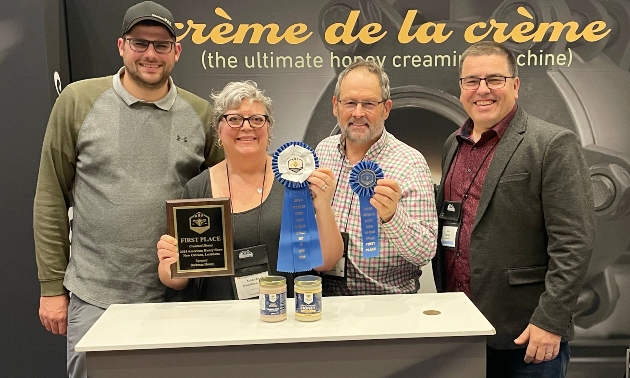
L-R Sebastien Laberge, Amanda Goodman Lee, Jeff Lee, Joel Laberge. The Lees used a revolutionary made-in-Canada specialized creaming machine manufactured by the Laberge’s CreamPal company from Quebec. It is the only one of its kind in British Columbia. — Photo courtesy Honey Bee Zen Apiaries
Now more than ever, we all depend on pollinators to keep our gardens thriving and healthy food growing. That's why we were especially honoured to enter the world of beekeeping with Amanda Goodman Lee, co-owner of Honey Bee Zen Apiaries in Creston (alongside her husband and business partner, Jeff Lee). Her profound encounter with bees led her to co-create a flourishing apiary that prioritizes sustainable practices.
From the lively hum of the hive to the challenges posed by climate change, we had a chance to learn about the essential role bees play in our environment and discover the delightful flavours behind Honey Bee Zen Apiaries' award-winning products.
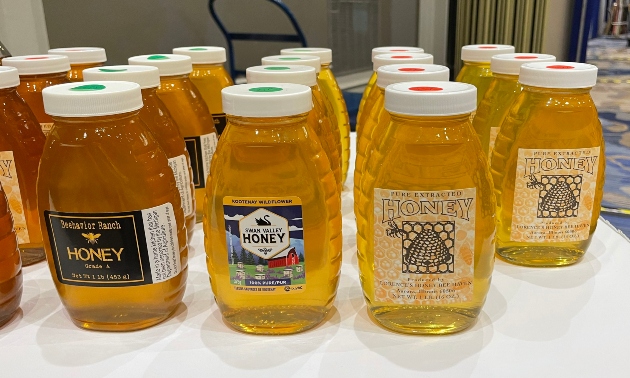
- Photo courtesy Honey Bee Zen Apiaries
Can you tell us about your journey into beekeeping and how it led to establishing your own apiary?
My husband and I worked in the media for many years. I was an advertising manager for The Vancouver Sun and The Province and had Science World in Vancouver as a client.
They wanted to host an exhibit called “The Science of Fear” and invited the media to participate in a challenge. We had to do things like pick up hissing cockroaches. I was invited to put on a “beard of bees” in which a beekeeper put a caged queen around my neck and then dumped thousands of bees onto a bristle board beneath her. The bees naturally wanted to be with the queen—her pheromones control the hive—and as they settled on my face I was very, very calm. The beekeeper remarked that I would be a good beekeeper, and when I came out of the booth I told Jeff what he said. Jeff had some collectable beekeeping books and so we decided to take a course, and voila! We became beekeepers. That was in 2010 or so, and from there we just grew and grew and grew.
We started with two hives, but very quickly grew to more than 40, and started to do pollination for blueberry growers.
I took the buyout from the newspapers in 2015, and Jeff in 2017 (he was a long-time political and investigative reporter for The Vancouver Sun). We already had an established brand in Vancouver (Honey Bee Zen) when we learned that Swan Valley Honey in Creston was for sale. It was a legacy company, more than 40-50 years old through two other owners, and we incorporated it into Honey Bee Zen. We have two brands.
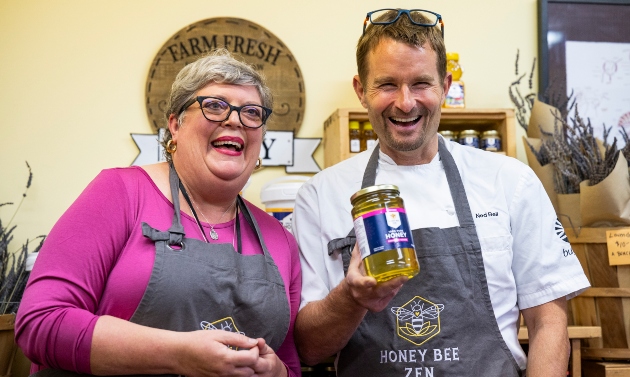
Amanda Goodman Lee (L) and Ned Bell (R) celebrate high-quality honey. Bell is a celebrity chef and the ambassador for the Buy BC program. He visited the farm in 2024 as part of the Basin Food Expo, and has been using their honeys in his recipe creations. - Photo courtesy Buy BC
How do you incorporate sustainable and eco-friendly practices into your beekeeping operations?
Bees are keystone animals in nature. Without them we don’t have many foods. They pollinate so many crops and foodstuffs. So for us, respecting the bees—both honey bees, which collect our honey, and native pollinators such as bumblebees—is crucial to our business. From how we grow our honey bees to where we put them to how we treat them for diseases to how we harvest the honey and even how we bottle and sell those products, we try very hard to create as low an environmental impact as possible.
We have a saying, “It’s all about the bees,” which means if we don’t take care of them we don’t have a business.
We use Integrated Pest Management practices to take care of the bees in the least harmful way. We use naturally-occurring organic acids, for example, to treat the bees for mites. We try very hard not to use synthetic miticides, which are only used as a very last resort.
When we package our honey, we prefer to use glass jars as much as possible, since they can be more easily recycled. We do use plastic where we can’t find a suitable glass alternative.
We also work with farmers who use low-impact best management practices that support sustainable uses.
And in a major way, we practice sustainability with our bees by, as much as possible, breeding and raising local stock. The industry has become accustomed to importing packages of bees from places like Australia and New Zealand to replace overwintered losses. By raising local queens and planning for overwintering losses by raising more bees than we actually need, we eliminate the necessity of importing packages, which come with a very high carbon footprint.
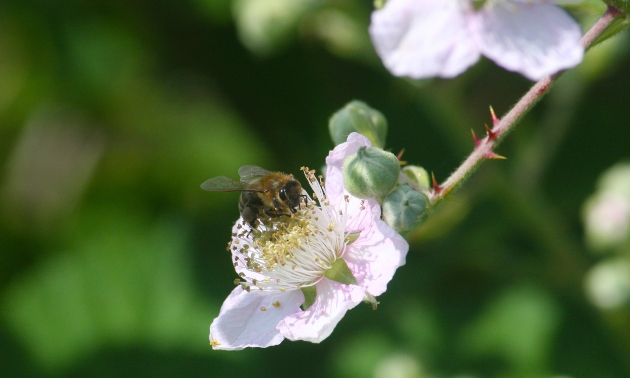
- Photo courtesy Honey Bee Zen Apiaries
What role do bees play in the local ecosystem, and how does your apiary contribute to environmental conservation?
There are more than 650 species of native pollinators in B.C., including bumblebees, miner bees, sweat bees, mason bees and the like. These, however, do not pack away honey in great amounts.
Honey bees, which we grow, are actually from Europe and elsewhere in the world; they are not native to North America.
Native pollinators are key to a vibrant local ecosystem. But so, too, are honey bees, which have added much to nature.
Our apiaries contribute to environmental conservation by adding pollination density to areas where native pollinators either are in low numbers, or cannot handle pollination needs. As an example, honey bees are critical to many types of forages grown in the Creston Valley. Bumblebees are terrific at buzz-pollinating certain types of plants, but they don’t do that with all types of flowers and forages.
Interestingly, there are many flowers that honey bees don’t visit that bumblebees do, such as the cornflower.
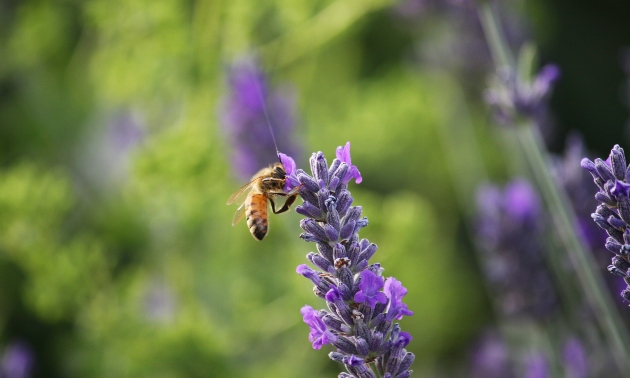
- Photo courtesy Honey Bee Zen Apiaries
How do you maintain the health and well-being of your bee colonies?
We rigorously monitor our bees for the stressors that can affect them, from lack of nectar or pollen (there is often a dearth of flowers at certain times of the year) to diseases and pests that can set them back.
One of the major health issues for bees is the varroa mite. It is an Asiatic mite that arrived in North America in the mid-1980s. Honey bees aren’t used to this mite, and it can vector a number of very serious viruses that can kill bees and hives.
As a result, our FIRST place to start in protecting the health of our colonies is to monitor them for mites and then take action when necessary.
We also monitor their food stores very carefully. Pollen, which they collect from flowers, is the base protein needed for growing broods. Nectar, which they turn into honey, is the energy source.
Without those two items, the colony can stall, starve and even die before new sources are found. So, when we see that the bees don’t have enough pollen or honey in the spring to get started or don’t have enough to make it through winter, we feed them pollen and sugar syrup, which they convert into a honey energy.
However, I need to point out that ethical beekeepers NEVER feed bees syrup during a honey flow, when the bees are actively foraging and making honey. Syrup is only used as an insurance against starvation in spring and fall, when the honey harvest is over.
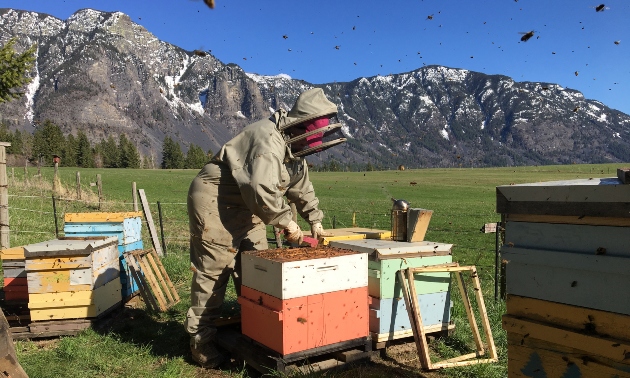
- Photo courtesy Honey Bee Zen Apiaries
What are some of the challenges you face as a beekeeper in Creston, BC?
The challenges we face are pretty much the same ones other beekeepers face: Protecting the bees from diseases, making sure we have enough of a harvest to sustain our business without creating food challenges for the bees, getting our products to market (which is a big issue in the Kootenays because of long distances and challenging geography.)
Of late, one of the biggest challenges has been the changing climatic conditions here. Wildfires in the summer disrupt foraging behaviour. Mild winters with periodic cold snaps can sap an overwintered hive very quickly. If bees do not cluster or go into a winter ball, they can easily eat themselves out of their food stores before Mother Nature starts up and provides the spring food they need.
One thing we have learned over and over and over is that no one year is like the next. We have to be nimble and be able to adapt to issues as they arise.
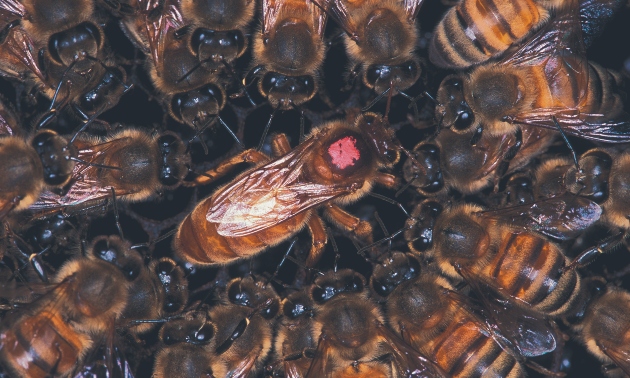
A honey bee queen with her devoted attendants. - Photo courtesy Honey Bee Zen Apiaries
Can you describe the types of honey produced at your apiaries and their unique flavors?
We have two brands: Swan Valley Honey, which produces our legacy liquid honey, which we call Kootenay Wildflower. When we bought the company it had a very stable clientele, and it made no sense to fold it into our established brand, Honey Bee Zen.
Honey Bee Zen produces all of our OTHER products, such as our varietal honeys, including Fireweed, Harvest Moon (a late-season darker honey) and Thousand Blossoms (a honey we collect in locations other than the valley floor.) HBZ also is the brand we use for all of our honey-and-wax based body care products and our candles, which are made of pure beeswax.
Our Kootenay Wildflower is a multi-flower honey that comes from forages including alfalfa, sweet clover, vetch, snowberry, and many other flowers growing in the Creston Valley.
Our Fireweed is a unifloral honey made up only of fireweed nectar, which we collect in burned or logged areas of the Purcell and Selkirk mountains.
Our Harvest Moon is a product of late-season harvesting when forages are mature. These can include garden herbs that add a strong flavour.
Our Thousand Blossoms is honey from mid-level areas, high enough up off the valley floor but where bees are accessing some of the mountain and domestic plants and flowers that grow there. It does not generally have alfalfa or valley clovers.
Lastly, we produce an array of Creamed Honey products, including our traditional cream, and about a dozen infusions flavoured with everything from lavender (grown on our farm) to lemon, chocolate, coffee, cranberry-orange and the like.
This year we won several North American awards for our honey:
- Creamed (traditional) - Best In Show and first place at the American Honey Show - the first time Canadians had won
- Creamed (traditional) - Top of Class at the North American Honey Show
- Creamed Infusion (Cranberry-Orange) - First Place, North American Honey Show
- Fireweed - First Place, extra water white class, American Honey Show
Yes, I know we’re bragging, but these were very tough contests!
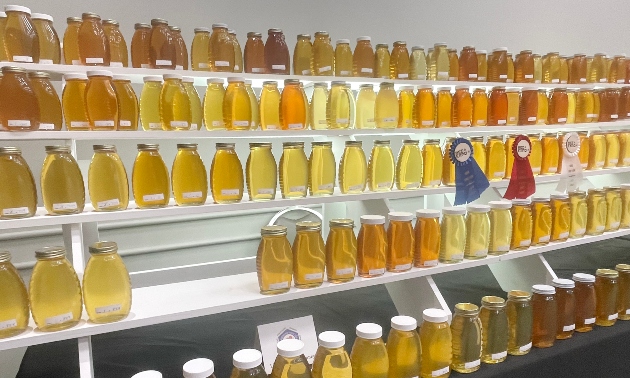
View of some exhibits at the North American Honey Show in Louisville, KY. It was the largest show of its kind in North America, with over 1,100 entries from more than 200 contestants. - Photo courtesy Honey Bee Zen Apiaries
Are there any specific initiatives or projects that Honey Bee Zen Apiaries is involved in within the Creston community?
We are regular supporters to many local initiatives through donations to fundraisers.
We are also active on several non-profit boards. Jeff is the chairman of Fields Forward, which owns and operates the Creston Valley Food Hub. I am the president of the Creston Valley Food Action Coalition, which runs the Creston Farmers Market, the HarvestShare program and other community support programs.
Jeff is also the B.C. director to the Canadian Honey Council and is a long-time executive member of the B.C. Honey Producers Association.
I am also the newly elected president of the East Kootenay Beekeepers, a branch of the BCHPA.
In addition, we have been, and continue to be long-time cooperators on bee and agriculture research projects. Those projects include cherry and apple pollen research for Agriculture and Agri-Food Canada, mite damage studies for the University of B.C. and Simon Fraser University, and queen bee health studies by UBC and the BCHPA’s Technology Transfer Program.
Lastly, we have been actively involved in sponsoring a Ukrainian family to settle in the Creston Valley. We hired an experienced Ukrainian beekeeper as our field manager. He brought his wife and two teenage children.
They loved living in Creston so much that they have now brought his mother, father, sister, brother-in-law and their baby, as well as his daughter’s boyfriend. Next month the last sister and her husband are arriving in Creston . . .
So, one decision led to stabilizing our business but it also brought an entire family here—and all of the adults and his daughter have jobs. So far and counting, at least eight jobs!
Can you share any memorable experiences or stories from your time as a beekeeper?
Jeff says one of his memorable experiences is the fact that beekeeping taught him how to slow down and appreciate things. As a reporter he was a very high performer, writing complex stories on tight deadlines. He would come home full of left-over energy. But when he went out to work in the bee yard, the bees didn’t like that energy and the banging and crashing around that he would do. So they reacted by “tuning” him up with their business ends.
Jeff had to learn to slow down, be calm, and above all, work with the bees.
A miraculous thing happened: The bees were happier, Jeff was happier (not being stung as much), and when he went back to work on Mondays, he was a much calmer, thoughtful reporter. His writing improved, even though he still had crazy deadlines.
It took a few months for him to realize what was going on, and to relax more contemplatively about what he was doing.
I really love that as a beekeeper when we travel we always try to find some local honey. We have met and been to remote areas in Mexico because the beekeeper invited us to see their apiary. Prior to Covid we were in Chelem Mexico (in the Yucatan) and we drove three hours to meet the beekeeper and his family. The family lived in a very poor area and we were welcomed into their home with open arms. The wife took me to their backyard and showed me the Melipona bees. Melipona are stingless bees and they collect honey but rather than building out comb honey as we know it from our honey bees the Melipona create these little wax like cisterns and to extract the honey they use a syringe. That is a lot of work to get a small jar of honey.
Beekeeping has led to many friendships around the world.
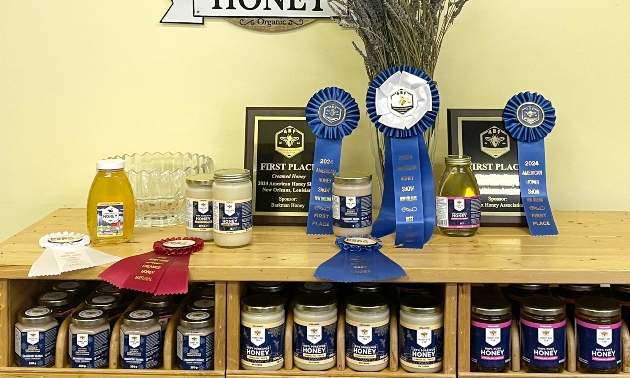
Combination of ribbons and honeys from the North American Honey Show (Louisville, KY) and the American Honey Show (New Orleans, LA).- Photo courtesy Honey Bee Zen Apiaries
What advice would you give to individuals interested in beekeeping or starting their own apiary?
The first one is: Take a course from a certified instructor. Don’t try to learn from the University of Google. The cost of a course is going to be the cheapest part of learning, and it’s better to learn through an established curriculum. The BCHPA has a number of certified instructors around the province who offer beginning beekeeping courses.
The second is: Find a mentor who will be willing to guide you on your journey. Most successful beekeepers—ourselves included—like to mentor new beekeepers.
Third: Join your local beekeeping club. This is another way of getting mentorship, but in a less formal way. Getting through your first winter is the goal, and after that things start to make sense.
And lastly, join the B.C. Honey Producers Association, which has tons of resources available to help newbees . . . pun intended. They offer education days, insurance, and one of the best beekeeping magazines in North America.
How do you see the future of beekeeping evolving, particularly in light of environmental changes and conservation efforts?
It will become increasingly challenging.
(As I indicated above) changing climate means new and different stressors on bees—both native and honey bees. Forage patterns are changing. Water sources are challenged in many places. Farmers are having to adapt by changing what they plant or grow.
For us as beekeepers, we also face major challenges because of new invasive pests. And as forages change, our expectations of how much honey we can produce also change. So from a business point of view we’re also at risk.
As well, as farmers age and retire, there isn’t the same number of new and young farmers coming in. That means land once productive, both for farmers and bees, declines in productivity. It is an issue not just for bees, but because of the decline in food produced for the public.
Lastly, as farmers face increasing pressure to produce more and to be as efficient as possible, they turn to pesticides and herbicides to increase yield, even if that means danger and damage to pollinators. So we, as beekeepers, take it on the chin. That’s why we work very hard to help educate and work with our farmer friends about what they need to do to protect the environment while at the same time producing good food for the masses.
Are there any new developments or innovations in beekeeping that you're excited about?
There are some new mite treatments being developed that should come on the market in the next few years. These will be helpful in reducing the very high overwintering mortality statistics we see. Among those treatments being explored are efforts to be more sustainable and environmentally friendly, both to bees and the lands they work.
Is there anything else you'd like to add?
We often get asked “is your honey pure” or “is your honey raw or unpasteurized?” This gets to the very issue that the public sees about access to good quality food.
The public is well aware of how good natural honey is, both from a consumption and a health benefits point of view. It is why we—and all beekeepers—say “know your local beekeeper”. There are many terrific folks who practice the same craft the way we do, and you can get local honey at just about any farmers’ market or local store.
Yes, you can buy cheap honey at box stores, but if you look closely you’ll often find it is a blend of honeys from other countries. It will usually also be highly filtered and heated to prevent crystallization, so as to improve shelf appearance.
What we do here at Honey Bee Zen and Swan Valley Honey is produce fine local honeys, treated with care, and retaining all of the goodness that the bees have brought us.
We believe in transparency and honesty. We have our honeys tested by two made-in-B.C. authenticity programs to show that we do not adulterate our honeys. It is our way of trying to combat honey fraud, a serious and developing problem in the world.
Our ethics demand us to do nothing less.

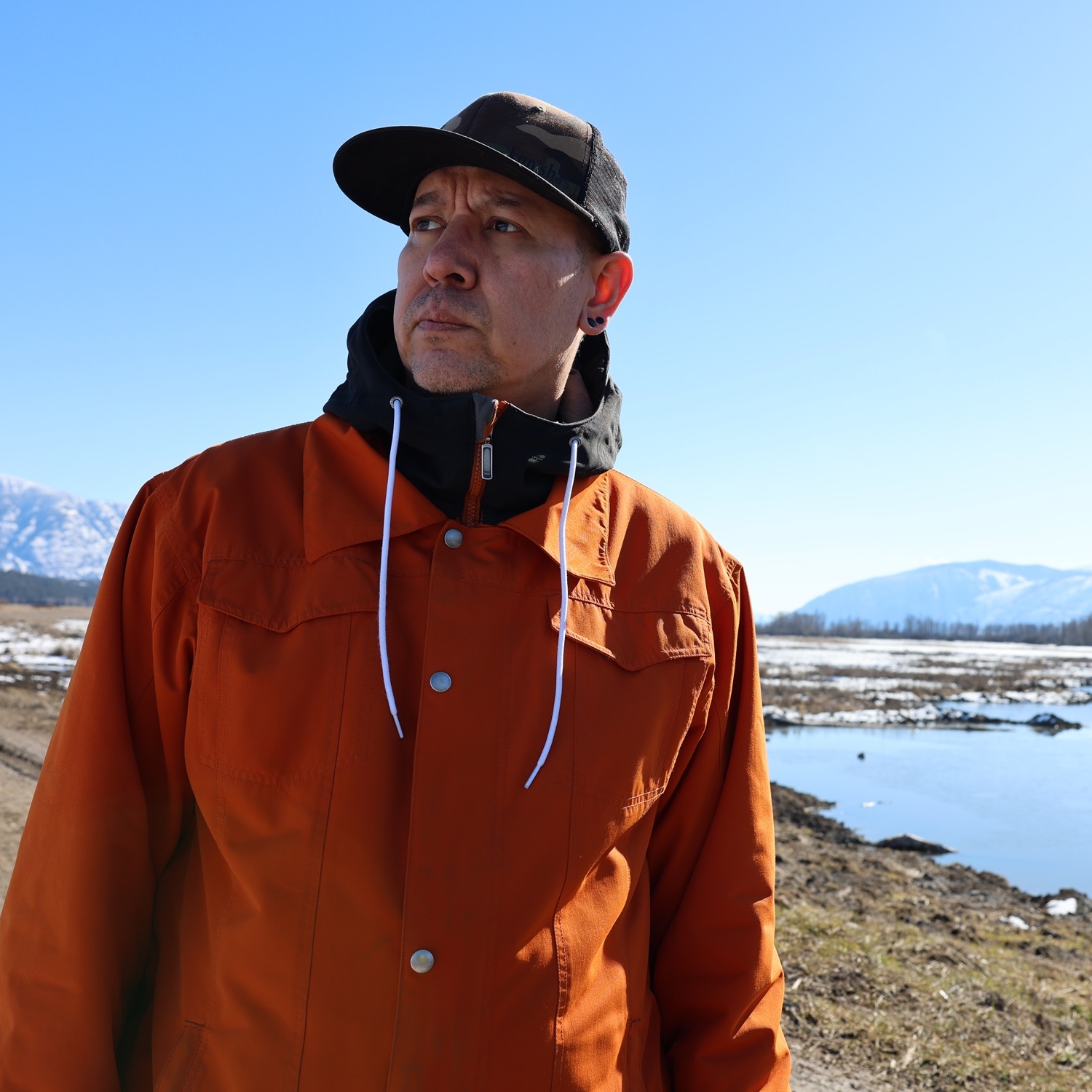

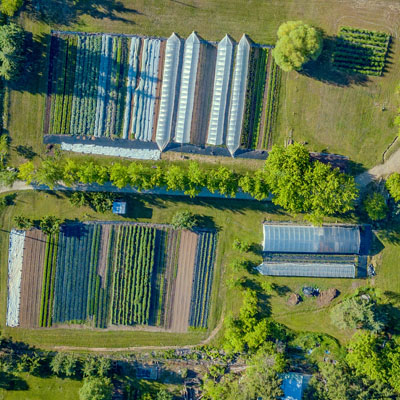

Comments